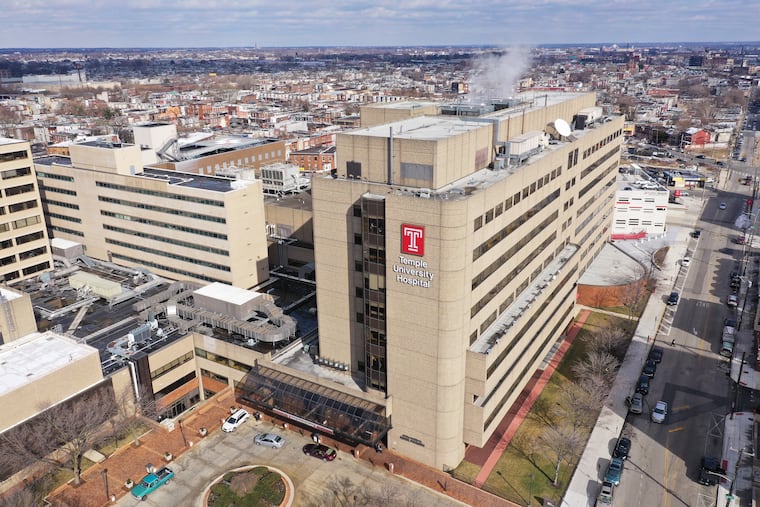Temple University reaches deal to sell Fox Chase Cancer Center
A final agreement is in the works and is expected within weeks. The price has not been disclosed.

Temple University has agreed to sell Fox Chase Cancer Center and its share of the insurer Health Partners Plans to Thomas Jefferson University following exclusive negotiations that started in January, the two Philadelphia nonprofits said Monday.
Both boards of directors have approved the transaction. The final price will be “set upon completion of the formal agreement in the weeks to come,” Temple and Jefferson said. In a recent $450 million bond-sale document, Jefferson said that the cash price for Fox Chase and Health Partners, which is mostly a provider of Medicaid insurance, could be “significant” and that it would have to take on additional debt.
The deal — part of an effort to strengthen Temple University Health System’s financial condition — will add to a string of acquisitions by Jefferson that have shuffled the region’s health-care landscape and expanded the scope of the Center City institution from three hospitals to 18 since 2015, including the pending deal for Einstein Healthcare Network. Jefferson also acquired Philadelphia University.
Temple and Jefferson, which are also partnering with Einstein Healthcare Network and Philadelphia College of Osteopathic Medicine on a bid for the bankrupt St. Christopher’s Hospital for Children, described the Fox Chase and Health Partners transaction as part of a wide-ranging collaboration including cancer care, education, and research.
“We’re ecstatic about this,” Temple president Richard M. Englert said. “Obviously, when we started all of this, we wanted to make certain that durability is one of the hallmarks of any kind of relationship, and this provides us that kind of durability. It clearly strengthens our financial situation, so that we can focus on our core mission. That includes population health, community health, and a long-term relationship with an outstanding university.”
Though a final agreement has yet to be signed, Englert said he was confident that the sale would be completed. “This is solid, and we know it’s going to happen,” said Englert, who declined to discuss the financial side of the transaction.
Jefferson’s chief executive, Stephen K. Klasko, did not respond to an interview request that was made through a spokesperson.
“Together with our pending merger with the Einstein Health Network, this unique collaboration with one of the state’s premier universities and health systems will present a statewide and national model for coordinated and enhanced access, quality, and clinical experience for patients throughout the community, especially the vulnerable North Broad Street and downtown corridors,” Klasko said in a news release.
Moody’s Investors Service said in a Jefferson ratings report last month that the acquisition of Fox Chase and Health Partners “could be transformative to the enterprise because of the scale and potential cost.” It could take more than a year after a final agreement is reached for the deal to be completed.
The purchase of Fox Chase, one of 50 comprehensive cancer centers nationwide — representing the National Cancer Institute’s highest designation — will strengthen Jefferson’s oncology services, Standard & Poor’s said.
Fox Chase had $12.4 million in operating income on $488 million in revenue in fiscal 2018, according to Temple Health’s audited statement. It has 100 beds in its hospital and employs about 2,000 people.
The Fox Chase-Health Partners acquisition is unusual in that it requires Jefferson to pay cash. Its acquisitions of Abington Health, Aria, Kennedy Health, Philadelphia University, and Magee Rehabilitation Hospital did not, as is the case with the Einstein deal that Moody’s does not expect to be completed until next year.
Despite not having to pay for those acquisitions, which have increased Jefferson’s annual revenue to an expected $5 billion in the year ended June 30 from $2.1 billion in 2015, Jefferson’s finances have deteriorated by some measures. For example, Jefferson’s unrestricted cash as a percentage of total debt has fallen to 141 percent this year from 194 percent two years ago, according to Moody’s.
Jefferson had $1.7 billion in debt before borrowing $450 million late last month. About $50 million of those proceeds were used to pay off older debt.
Temple’s health system, which survives because of supplemental state funding that helps pay for care to the poor, had about $500 million in debt at the end of March.
The $84 million purchase of Fox Chase in 2012 by Temple was part of an effort under chief executive Larry Kaiser to make the system more financially sustainable by expanding into more complex services. Kaiser had significant successes in returning Fox Chase, which is in the Burholme section of Northeast Philadelphia, to profitability and developing a leading organ-transplant program, but the financial drag of its North Philadelphia location has been difficult to overcome.